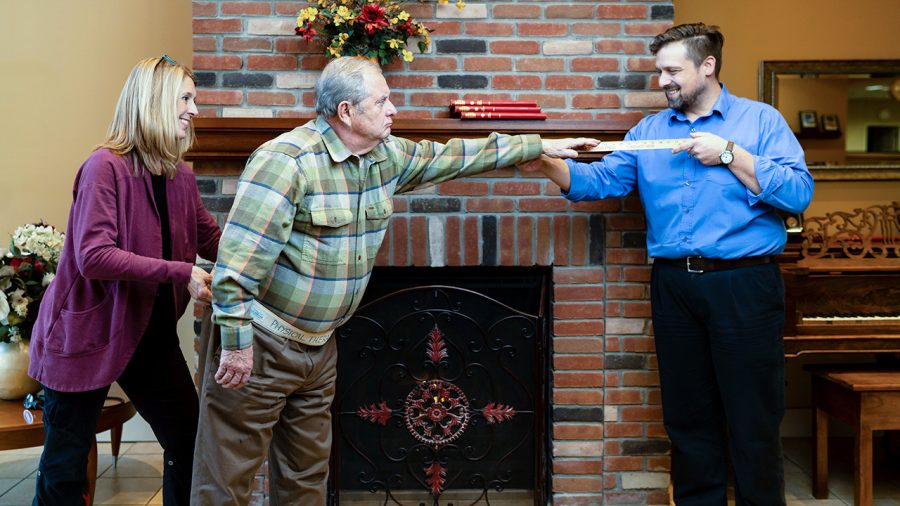Professors offer senior citizens in-home care with HOP-UP PT program
Courtesy of Oakland University
Photographed by Robert Hall Photography (www.robhallvisuals.com)
For many senior citizens, a fall injury can be a devastating setback. Two Oakland University professors want to change that.
HOP-UP PT — Home-based Older Person Upstreaming Prevention Physical Therapy — is a physical therapy program designed by OU assistant professors of physical therapy Dr. Sara Arena and Dr. Chris Wilson.
“[HOP-UP] is a prevention-focused program in the home of older adults who are at risk for potentially future decline,” Arena said. “What happens is a community center refers to us to do an evaluation and provide some guided intervention that are based at keeping the person healthy, safe and in their homes.”
While the program received its first funds in 2016, it has its roots in the professors’ shared desire to solve a problem with senior care.
“We have both worked with older adults for a long time after they’ve had something happen to them — after they’ve had an injury or a fall or some type of health event,” Wilson said. “And we both kind of looked at each other and said, ‘We would love to get to these folks to prevent these injuries or accidents from happening,’ and that is where we kind of came up with the program.”
HOP-UP accounts for the obstacles of living as a senior citizen, such as decreased vision, worsening balance, limited mobility and fixed incomes.
The concepts for HOP-UP were first made following a conversation with the Auburn Hills Community Center.
“[The community center staff members] were identifying these individuals who met some of that criteria, but they did not know how to address them because they were not a healthcare provider,” Arena said. “So, they came to us and, with them, we developed some of the ideas and concepts [for HOP-UP].”
The HOP-UP program works by having licensed physical therapists go to a senior’s home to evaluate and provide participants with health recommendations and give them a free blood pressure cuff and Fitbit activity monitor. Ideally, participants then receive six sessions of in-home training with the therapists.
But since the goal of HOP-UP is to become a nationwide standard form of care accepted by insurance providers, a control group of seniors who receive their training six months after evaluation had to be established.
“We really did not think it was fair to just evaluate without eventually giving the program, so we have a crossover design,” Arena said. “Everyone will get the program, it will just be at different times and that is really only for research purposes.”
The HOP-UP program has a current limit of 150 participants, which has been reached, though the professors would like to expand their reach and capacity with additional funding.
“If people are interested, we certainly would encourage them to reach out to us about that because as more money becomes available will be able to open up more spots,” Arena said.
According to Wilson, HOP-UP has attracted the attention of communities throughout and outside of the state and has had positive feedback from participants. Along with Auburn Hills, some of the other communities working with the professors are Novi, St. Clair Shores and Van Buren County.






